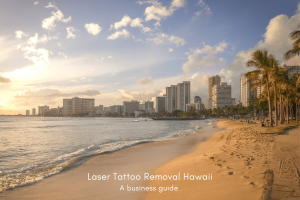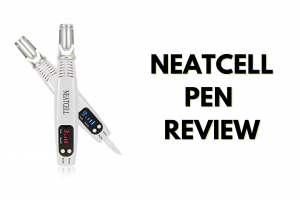
In Arizona, there are more than 2.1 million* tattooed individuals. In Phoenix alone, there are at least 240 tattoo parlors but only around 58 clinics and spas that offer tattoo removal services. See a potential market for tattoo removal business in Arizona? Read this article to get a grasp on everything you need to know before starting a tattoo removal shop in Arizona (Arizona tattoo removal regulations, tattoo removal market, tattoo removal business guide, etc).
Covering the basics
When starting a tattoo removal business, there are several crucial things to consider, plan, and implement. For a step-by-step guide to starting a tattoo removal business, click here. The business will also require insurance coverage. For a detailed analysis of which insurance covers the business will need, click here.
It ultimately comes down to this: laser tattoo removal.
Laser removal has emerged as the go-to treatment. It is effective and comparatively safe, being a non-invasive skin treatment. A laser tattoo removal clinic can be a highly profitable business.
Tattoo Removal Market

Not everyone loves their tattoo forever. According to Harris Poll (2015), almost a quarter of people with tattoos suffer from tattoo regret. In fact, the tattoo removal market is currently witnessing a huge expansion. It is set to grow into a $795 million market by 2027 at a growth rate of 19.3% (Allied Market Research). More than 2.1 million people in Arizona have at least one tattoo. Many of these 2.1 million will face tattoo regret too. And when they do start looking for removal options, your tattoo removal business in Arizona can emerge as their savior.
Arizona Tattoo Removal Regulations
Since 2018, the Arizona Department of Health Services (ADHS) has taken over the responsibilities and functions of the Arizona Radiation Regulatory Agency (ARRA). The ARRA itself had succeeded the Arizona Atomic Energy Commission in 1980. The body was responsible for the regulation, inspection, and licensure of the sources and use of radiation across Arizona. The Medical Radiologic Technology Board of Examiners (MRTBE) under the ARRA was then responsible for the certification of laser technicians. This is now managed by the ADHS Bureau of Special Licensing (BSL).
Statutes and rules governing laser technicians in Arizona are found in two places – the Arizona Revised Statutes and the Arizona Administrative Code. Article 14 of Title 9, Chapter 7, of the Arizona Administrative Code deals with “registration of Nonionizing Radiation Sources and Standards for Protection against Nonionizing Radiation.” This segment lays down definitions concerning lasers, radiofrequency and microwave radiation, intense pulsed light, etc. (see here: https://apps.azsos.gov/public_services/Title_09/9-07.pdf). It also provides a detailed list of protocols – from the responsibilities of the registrant, operator, and laser safety officer; to laser prohibitions and safety protocols.
Title 32, chapter 32, article 2 of Arizona Revised Statutes deals with cosmetic lasers and injection procedures. It lays down requisites mandatory for any laser technician to be able to perform cosmetic laser procedures.
An individual must complete 40 hours of didactic training from a department-certified training program. For laser hair removal, twenty-four hours of hands-on training is also required. For cosmetic procedures other than hair removal, the individual must have an additional twenty-four hours (minimum) of hands-on training performing or assisting in at least ten procedures of each type of cosmetic treatment. They must receive their clinical training under the observation of a health professional or a certified laser technician with at least 100 hours of hands-on experience per cosmetic procedure. The provisional certificate from the training program and the certificate of training authorized by the supervising health professional/laser technician must then be submitted to the department. The department may then issue the certification for a state-certified laser technician.
With regard to practice, the article states that
“A laser technician may use a laser or IPL device in the following circumstances:
- For hair removal under the indirect supervision of a health professional whose scope of practice permits the supervision.
- For cosmetic purposes other than hair removal if the laser technician is directly supervised by a health professional whose scope of practice permits the supervision.”
Section 32-3231 defines ‘directly supervised’ as “a health professional who is licensed in this state and whose scope of practice allows the supervision supervises the use of a laser or IPL device for cosmetic purposes while the health professional is present at the facility where and when the device is being used.” The same section defines ‘indirect supervision’ as “supervision by a health professional who is licensed in this state, whose scope of practice allows the supervision and who is readily accessible by telecommunication.”
Any complaint from the public or another agency/board regarding the training, education, or incorrect practice by a laser technician will lead to disciplinary action against her/him. The supervising health professional, employer of the laser technician as well as the registrant who owns or operates the laser device will be held equally responsible for the mistakes made by the laser technician. They will also be subjected to disciplinary action.
Application form for becoming a certified laser technician: https://www.azdhs.gov/documents/licensing/special/laser-technicians/clt-complete-initial-application.pdf
Arizona Tattoo Removal Regulations (In short):
- In Arizona, laser technician license is state authorized.
- The state recognizes only a given set of laser training schools.
- Medical background is not a prerequisite for laser technician certification.
- To become authorized in laser tattoo removal, an individual is required to complete the training for both laser hair removal and laser tattoo removal.
- And finally, a certified laser technician can perform laser tattoo removal only under direct supervision – a medical director on site.
Approved Training Schools for Laser Technicians in Arizona

The Bureau of Radiation Control provides a comprehensive list of accepted training schools for Certified Laser Technicians (CLT), Intense Pulsed Light (IPL), and Laser Safety Officers (LSO). This list also mentions which specific programs of these schools have been approved (for example, 40 Hours didactic only for cosmetic laser technicians, 24 Hours training and 10 hands-on procedures-supervisor in room for other cosmetic procedures, laser safety officer training, etc.). Some of the approved training schools are – National College of Cosmetic Lasers & Injectables, Southwest Institute of Natural Aesthetics (SWINA), National Laser Institute, IMAj Institute, etc. For the complete list, visit https://docs.google.com/document/u/3/d/e/2PACX-1vT_KRgZkYEV-vg5VRGZzvpWZ-RzMVOwSCo8clPNrxMGQ6z-LkuyciUQ_7EEbT7dn6Ps8Lxysg6JNmdf/pub.
Arizona Business Support
There are many organizations that provide businesses with vital advice, assistance, and resources specific to Arizona. Some of these are:
- The Arizona branch of SBA has a lot to offer. The Arizona district office of the SBA is not only a storehouse of information but also provides networking opportunities through its various small business events. The Arizona Small Business Resource Guide (see here: https://www.sba.gov/sites/default/files/2020-08/SBA-AZ_20-508.pdf) is a comprehensive guide for starting a business in Arizona, covering everything from funding options to state policies and permits.
- The Arizona Small Business Association also provides various resources – professional networking, support resources, business advice, and education.
- The Arizona Small Business Development Center (AZSBDC) Network helps small businesses launch, grow, and sustain through counseling, training, and other such stimulating resources.
Note: This article does not offer legal advice or interpretation.
*Based on statistics from https://www.ipsos.com/en-us/news-polls/more-americans-have-tattoos-today




